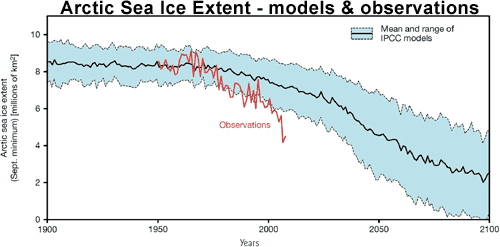The release of a new IPCC assessment, or even a new Summary for Policy Makers as we have at hand today (PDF), is legitimate cause for excitement. In no other field does a global body gather regularly to summarize the state of scientific research in a discipline, nor does one usually get to see the sausage-making as scientists hammer out that consensus.
 Observed (red line) and IPCC-modelled September Arctic sea ice extent in millions of square kilometres. Solid black line gives the average of 13 IPCC AR4 models while dashed black lines represent their range. (Copenhagen Diagnosis 2009 via Skeptical Science).
Observed (red line) and IPCC-modelled September Arctic sea ice extent in millions of square kilometres. Solid black line gives the average of 13 IPCC AR4 models while dashed black lines represent their range. (Copenhagen Diagnosis 2009 via Skeptical Science).Scientific consensus, after all reflects the state of mind of thousands of scientists around the world, their assessment of the scientific literature, their sense of which colleagues are doing great work, and their sense of where the field is headed. It can take months and even years for a paper to be published, so the published literature is always going to be well behind the cutting edge of research. Then it takes time for other scientists to evaluate a new paper, to see whether its results hold up, and to decide whether their own research can build on those results.
IPCC reports have to lock that dynamic process in stone. In order for a paper to be considered for inclusion in the analysis for the IPCC report coming out today, the paper had to be submitted for publication by August, 2012. A year's worth of new science is already missing from this report, then. That means a paper in Science last March which extended the famous "hockey stick" graph back from 1000 years to 14,000 didn't make the cut for this assessment.
As Steve Newton pointed out yesterday, "this is no great tragedy; important new papers will find their way into the next report, not to mention graduate seminars and climate textbooks." And giving time for the community to assess the paper is certainly important. But it does mean that the assessment we're getting today is already far out of date.
The IPCC's process also makes its assessment of consensus conservative. New York Times reporter Justin Gillis tracked the effects of that conservatism on two areas of this new assessment: future sea level rise and the predicted effect of doubling atmospheric carbon dioxide. In the former, the IPCC excluded solid new research suggesting greater sea level rise than previously predicted, while in the latter the IPCC incorporated iffier new research that lowered the estimate.
This isn't a new problem. As SkepticalScience points out, the IPCC has consistently predicted less sea level rise than we've observed, and tends to understate the substantial role of humans in climate change. A 2012 assessment by Keynyn Brysse, Naomi Oreskes, Jessica O’Reilly, and Michael Oppenheimer (discussed in Scientific American) found that the IPCC, and climate scientists in general, tend to err on the side of least drama, thus underemphasizing the most worrisome outcomes:
Our analysis of the available studies suggests that if a bias is operative in the work of climate scientists, it is in the direction of under-predicting, rather than over-predicting, the rate and extent of anthropogenic climate change.
Brysse, et al. (2013) Climate change prediction: Erring on the side of least drama?, Global Environmental Change, 23(1):327-337
Bear this in mind as you read IPCC's Fifth Assessment report, that things are likely to be worse than IPCC is prepared to state, and that the next report will surely be even more worrisome.

